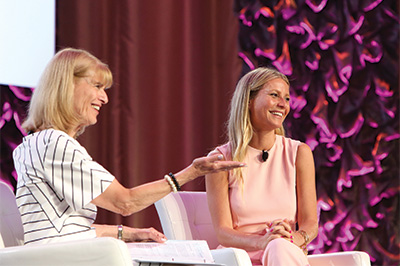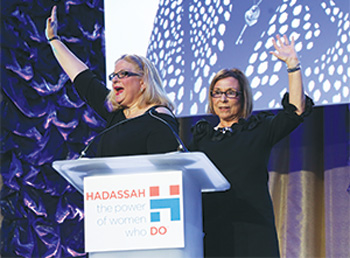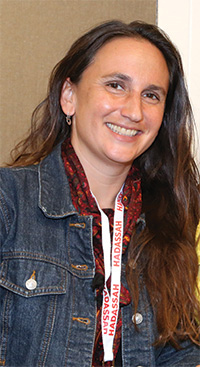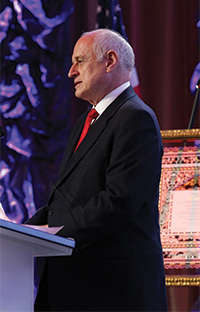Hadassah
Feature
Hadassah Convention: The Power of Our Dreams

Delegates danced in the aisles and waved signs for their regions. As speaker after speaker took the stage, oversized screens behind them flashed large, live images. One dignitary wore a red cocktail dress, another favored red, white and blue. A parade of past presidents posed for pictures as the Journey hit “Don’t Stop Believin’” blared overhead.
Unlike the Republican and Democratic national conventions—the latter one happening simultaneously—this meeting was far from the headlines. But Hadassah’s 98th National Convention in Atlanta, July 25 to 28, brought its own star power, and the focus throughout was decidedly on the future.
“The Power of Our Dreams” theme rippled through the entire convention, held at the Atlanta Marriott Marquis. Several speakers, including Atlanta-based Ambassador Judith Varnai Shorer, consul general of Israel to the Southeastern United States, invoked Hadassah founder Henrietta Szold when they boldly urged the crowd of 900-plus—most of them women but also a few dozen men—to “dare to dream, and when you dream, dream big.”
Shorer was also one of many to note that Hadassah, more than a century old, was founded before Israel became a state and American women could vote, and now is the largest Jewish women’s organization in the United States.
“Working together, our dreams will become reality,” convention chair Carol Ann Schwartz and vice chair Merna Shapiro promised at the opening plenary, in keeping with the theme. Ellen Hershkin, in her first convention address as Hadassah national president, noted how the organization has achieved dreams in the past. “Ever since our first two nurses arrived in Jerusalem in 1913, Hadassah has been a laboratory of dreams to strengthen Israel and help humanity,” she said. “We have saved and improved countless lives. We have educated children.
“We have advocated and agitated,” she continued, “marched and motivated, empowered others and, in the process, empowered ourselves, all in the service of fulfilling our dreams.” Dreams can take us places we cannot conceive, she said, pointing out that Hadassah’s founders couldn’t have foreseen organ transplants, stem cell treatments or the underground operating rooms at the state-of-the-art Sarah Wetsman Davidson Hospital Tower at Ein Kerem. Hershkin spoke of the privilege of being president at the fruition of other dreams, citing, for example, Hadassah’s launch in April of the Coalition for Women’s Health Equity. The coalition is partnering with major American organizations like the American Heart Association and the National Organization for Women to end inequities against women in medical research, funding and support. (For a full report on Hadassah Medical Organization developments reported at convention, read “Healing and Excelling at the ‘New Hadassah.'”)

At the opening gala, Hershkin introduced Oscar-winning actress Gwyneth Paltrow, and presented her with Hadassah’s first Power of Our Dreams Award. “We honor her first and foremost for her values, which are Hadassah’s values,” said Hershkin, praising the celebrity as an advocate for women’s health, medical research and youth who honors her Jewish roots with mitzvot.
As Paltrow strode onstage in a peach pantsuit—perhaps a nod to her visit to the Peach State—delegates popped out their smartphones to record the moment.
“I know I do look as WASPy as they come,” quipped the blond-haired, blue-eyed honoree. “But as some of you know, I am mostly a Jewish girl.” The daughter of actress Blythe Danner and the late producer-director Bruce Paltrow introduced herself as the descendant of 33 rabbis from Eastern and Central Europe on her father’s side. Paltrow, too, remarked on the convention dream theme. “The Talmud explains that each of our souls carries a piece of God,” said Paltrow, a student of Kabbalah. “Each of us has power to manifest.” In understanding what Hadassah does, she added, “I feel that I should be the one honoring you all.”
Powerhouse speakers and sessions continued to motivate attendees throughout the four days of convention, interspersed with morning prayer services, yoga, dining, dancing, shopping and folk music by Julie Silver and “kosher gospel” by Joshua Nelson.
Hadassah Executive Director and CEO Janice Weinman spoke about the power of advocacy. “We can never take for granted the privilege to have our individual, informed and independent voices heard directly and personally,” Weinman said in her opening address, noting the organization’s effort to “fulfill the dreams of women deprived of equal medical care, women exposed to inhuman treatment and women denied access to economic and social benefits. Through your participation, we have been able to influence the Research for All Act, the Women’s Preventive Health Awareness Campaign and the Justice for Victims of Trafficking Act.” She also mentioned Hadassah’s efforts to counter the Boycott, Divestment and Sanctions movement against Israel. “Over the last year we also have been outspoken on the issue of BDS,” she said, adding that the organization worked with the Israel Action Network to create and distribute the advocacy guide, “How to Talk about Israel.”
Georgia Attorney General Sam Olens, the state’s highest-ranking Jewish elected official, presented Hadassah with a proclamation from the state. He took the opportunity to speak about human trafficking, which can include coercion of a person for labor, services or commercial sex acts, or using children under the age of 18 for commercial sex. There are too many, mostly men, “who are buying our children for sex,” he said. “When you buy a child for sex, just like the seller, you need to be put in jail for a long, long time.” Olens reported that in Georgia human traffickers face 25 years to life in prison.
The issue was taken up at one of the convention’s many breakout sessions focused on advocacy. “A Call to Action: End Human Trafficking” featured author Sharron J. Brown, a former stripper who was molested by her babysitter at age 5 and continued to be sexually exploited throughout her youth. Today, she advocates against sex trafficking and child exploitation.
Georgia prosecutor Dalia Racine reminded the audience, “Human trafficking knows no boundaries, knows no limits, knows no race, knows no religion. It takes one bad decision as a teenager. If you have never made a bad decision as a teenager, God bless you.”
Another session speaker, Letty Cottin Pogrebin, who dreamed of empowering women when she cofounded Ms. magazine with Gloria Steinem in 1971, brought humor to the session, “Like Mother, Like Daughter.” She revealed that she had been a cheerleader at Brandeis University in Waltham, Mass.: “I know that’s kind of a cognitive dissonance!”
She and her daughter and fellow author, Abigail, shared their Jewish journeys. Letty Pogrebin traces her feminist roots to age 15, when her mother died and she wasn’t counted for a shivah minyan. She dropped out of religion for 15 years, then reclaimed her Judaism and became hazzanit of a Fire Island, N.Y., minyan for 13 years. Abigail Pogrebin—whose twin, Robin, is also a writer—became a belated bat mitzvah at age 40. Ten years later, she’s now the president of Central Synagogue, a large Reform congregation in Manhattan. “The truth is, it’s where I live now. I live Jewishly,” she said.

Like Abigail Pogrebin, writer and educator Naomi Katz doesn’t remember a time when women didn’t have rights. A product of the Young Judaea youth movement who now lives in Israel, Katz believes young women are looking for something different from Hadassah than their mothers and grandmothers sought from the organization. “Women in their 20s really need support,” suggested the author of Beautiful: Being an Empowered Young Woman. Young leaders should cultivate their unique feminine leadership qualities, such as emotional intelligence, empathy, generous love and toughness that sets boundaries, said Katz, who was featured at several sessions focusing on developing young leadership.
In one session, Katz exchanged ideas and heard from several dozen younger members who spoke about what being a leader really means. For several, including Delaney S. Rieke, president of the Los Alamos, N.M., chapter, Hadassah helped them find their voice. A convert to Judaism who came from a Fundamentalist Christian family, Rieke said her love of Judaism developed in tandem with her connection to Hadassah. “I knew I wanted to be with other Jewish women,” said Rieke, a current Hadassah Leadership Fellow. “The more I learned, the more I fell in love; they empower me.”
Toward the end of the convention, Hadassah honored Malcolm Hoenlein, executive vice chairman of the Conference of Presidents of Major American Jewish Organizations since 1986, with its highest honor, the 2016 Henrietta Szold Award.
“No other person in our time combines your brilliant organization and leadership skills, your knowledge of Jewish affairs and depth of Jewish service,” said presenter Marcie Natan, immediate past national president of Hadassah.
Hoenlein noted that the convention took place during the period on the Jewish calendar known as the Three Weeks, prior to Tisha B’Av, when we mourn the destruction of the First and Second Temples, among other tragedies. The story is relevant today, he said: “In the U.N., they’re still trying to destroy the walls of Jerusalem and take it away from us.”
Speaking to multiple standing ovations, he implored delegates to teach their children the miracle of being a Jew. “When Jews stand together, great things happen,” he said. “Unity is one precondition God set for us to get Torah.”

Hadassah women, generations of them, clearly stand together as friends, colleagues and sisters. At many sessions and fund-raising dinners, one woman after another told of being part of a three-, four- and even five-generation Hadassah family. For one of those five-generation members, Sherry Keller, 84, of Monroe Township, N.J., there was never a question that Hadassah would become a part of her life. Both her mother and mother-in-law belonged to the Menorah Chapter in The Bronx, N.Y., and fought over who would pay her then-$5 membership dues, she recounted in an interview at the Founders Dinner for major givers. Hadassah inspired her to learn, to teach—and to become a registered nurse, which she did in her late 40s.
Hadassah and Zionism, she said, means “being part of a people, part of a life of Jewish experiences and learning.” Zionism was also the featured topic of a plenary moderated by former CNN correspondent Linda Scherzer.
For Dafna Michaelson Jenet, 43, an alumna of one of Hadassah’s young leadership programs, Hadassah also means being part of an extended family. Born in a former Hadassah hospital in Tel Aviv, she lives in Commerce City, Colo. For her 30th birthday, her grandmother—her favorite person in the world and her mentor—gifted her with a Hadassah membership and a book on Henrietta Szold. As the former Denver chapter president explained during a break at the convention, “I read the book and fell in love with Henrietta Szold.”
Her positive experiences led her to create a program around a deck of cards called “52 Reasons To Be Proud of Hadassah,” for which she won the Hadassah Judith Epstein Memorial Award in 2007 for a community project that successfully promotes Hadassah in a positive and meaningful way. She also designed a Young Women’s Texas Hold’em Poker Tournament to engage and educate young women about Hadassah, resulting in new members and donors.
Michaelson Jenet wrote It takes a little crazy to make a difference, a book about ordinary people in all 50 states solving problems in their communities. She lives by the mantra that appeared to motivate many of the activist women at the convention: “I will not complain about a problem unless I’m involved in the solution.”
NUMBERS & POLICIES
Hadassah is reducing the cost of a life membership from $360 to $250 but is maintaining its annual membership rate of $36 through 2017 after delegates at the national convention raised objections to a motion to raise the amount to $54.
These were among the decisions made during the national business meeting on July 26.
The dues issue engendered the most discussion, with concerns raised by many delegates that raising the annual rate would hurt efforts to bring in new, especially younger, women. After considerable debate, Hadassah officials announced they were withdrawing the motion.
In other developments, Hadassah, the Women’s Zionist Organization of America:
Raised $2.5 million in pledged donations at the convention.
Voted on several policy issues, including to:
Expand and reaffirm its U.N. Reform Policy Statement to support the Conference of Presidents’ Declaration Opposing Discrimination Against Israel at the United Nations;
Reaffirm its steadfast dedication to Zionism and firm commitment to The Jerusalem Program, the official platform of the World Zionist Organization and the international Zionist movement;
Reaffirm its support for equality and equal protections under the law for LGBTQ persons; and
Reform and expand its support for women as caregivers—for their own families and for others, including support for paid sick leave, paid family and medical leave and flexible workplace policies to support unpaid caregivers.










 Facebook
Facebook Instagram
Instagram Twitter
Twitter
Leave a Reply